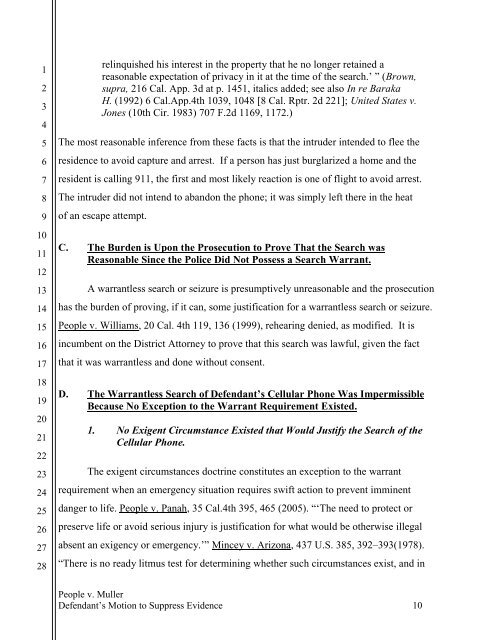muller-motion-to-suppress
muller-motion-to-suppress
muller-motion-to-suppress
You also want an ePaper? Increase the reach of your titles
YUMPU automatically turns print PDFs into web optimized ePapers that Google loves.
1<br />
2<br />
3<br />
4<br />
5<br />
6<br />
7<br />
8<br />
9<br />
10<br />
11<br />
12<br />
13<br />
14<br />
15<br />
16<br />
17<br />
18<br />
19<br />
20<br />
21<br />
22<br />
23<br />
24<br />
25<br />
26<br />
27<br />
28<br />
relinquished his interest in the property that he no longer retained a<br />
reasonable expectation of privacy in it at the time of the search.’ ” (Brown,<br />
supra, 216 Cal. App. 3d at p. 1451, italics added; see also In re Baraka<br />
H. (1992) 6 Cal.App.4th 1039, 1048 [8 Cal. Rptr. 2d 221]; United States v.<br />
Jones (10th Cir. 1983) 707 F.2d 1169, 1172.)<br />
The most reasonable inference from these facts is that the intruder intended <strong>to</strong> flee the<br />
residence <strong>to</strong> avoid capture and arrest. If a person has just burglarized a home and the<br />
resident is calling 911, the first and most likely reaction is one of flight <strong>to</strong> avoid arrest.<br />
The intruder did not intend <strong>to</strong> abandon the phone; it was simply left there in the heat<br />
of an escape attempt.<br />
C. The Burden is Upon the Prosecution <strong>to</strong> Prove That the Search was<br />
Reasonable Since the Police Did Not Possess a Search Warrant.<br />
A warrantless search or seizure is presumptively unreasonable and the prosecution<br />
has the burden of proving, if it can, some justification for a warrantless search or seizure.<br />
People v. Williams, 20 Cal. 4th 119, 136 (1999), rehearing denied, as modified. It is<br />
incumbent on the District At<strong>to</strong>rney <strong>to</strong> prove that this search was lawful, given the fact<br />
that it was warrantless and done without consent.<br />
D. The Warrantless Search of Defendant’s Cellular Phone Was Impermissible<br />
Because No Exception <strong>to</strong> the Warrant Requirement Existed.<br />
1. No Exigent Circumstance Existed that Would Justify the Search of the<br />
Cellular Phone.<br />
The exigent circumstances doctrine constitutes an exception <strong>to</strong> the warrant<br />
requirement when an emergency situation requires swift action <strong>to</strong> prevent imminent<br />
danger <strong>to</strong> life. People v. Panah, 35 Cal.4th 395, 465 (2005). “‘The need <strong>to</strong> protect or<br />
preserve life or avoid serious injury is justification for what would be otherwise illegal<br />
absent an exigency or emergency.’” Mincey v. Arizona, 437 U.S. 385, 392–393(1978).<br />
“There is no ready litmus test for determining whether such circumstances exist, and in<br />
People v. Muller<br />
Defendant’s Motion <strong>to</strong> Suppress Evidence 10


